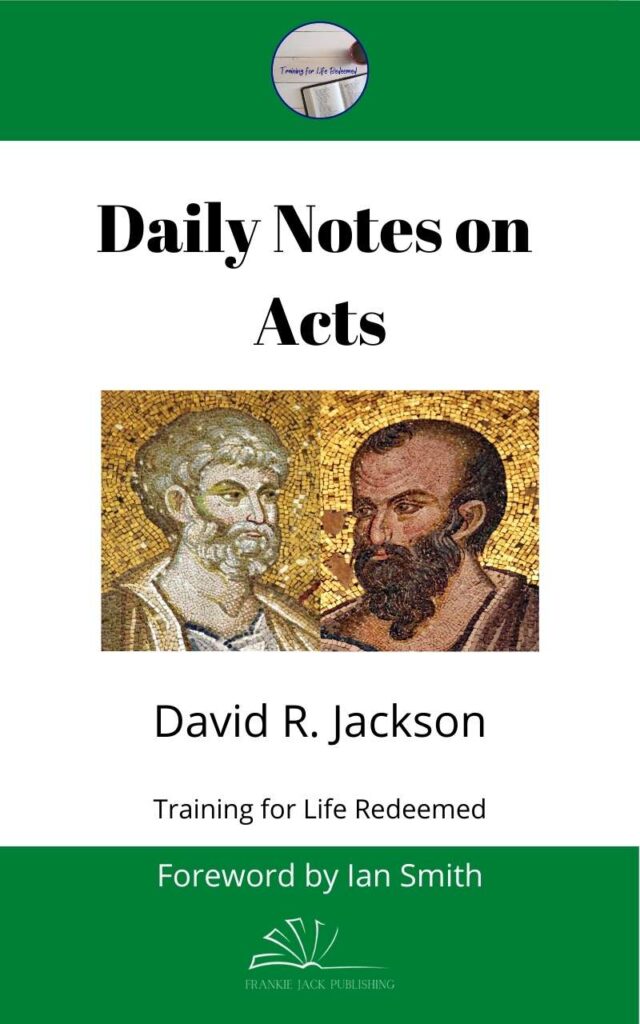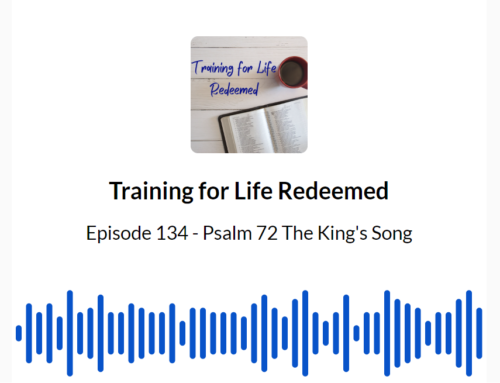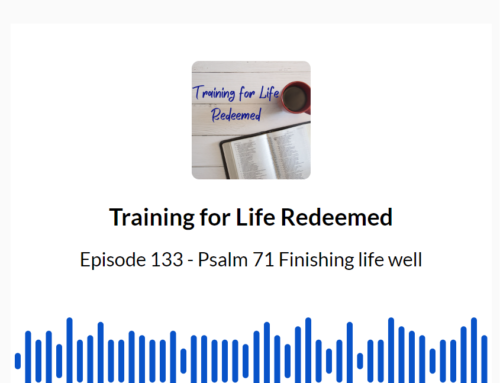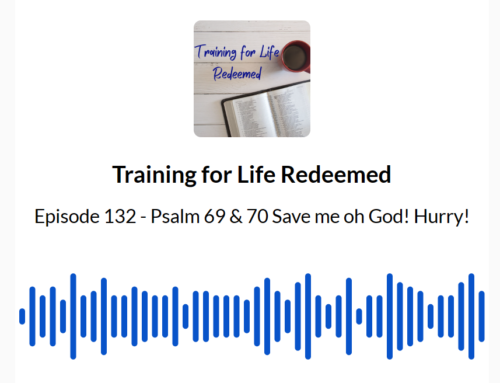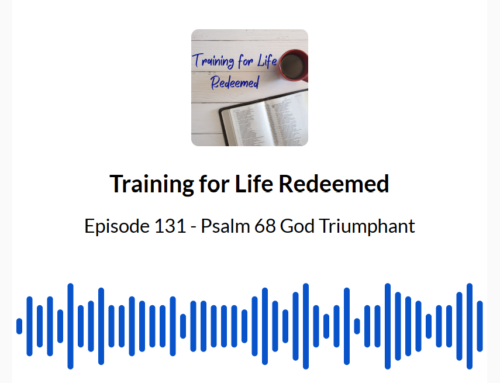The good news breaks down the barriers of sin and separation and reconciles enemies and "the other."
In this second part of Acts the Gospel moves out from Jerusalem to Judea and touches the nations.
Get the book: Daily notes on Acts
Take the challenge to work through the Book of Acts over thirty-five days. The notes will inform, and set you thinking. They are easy to read in under twenty minutes and include colour photographs, and a section for further reflection or discussion. Ideal for those who want to be prepared to read the Bible with first-time readers. At the end there is a section on words and their meaning, as well as who’s who in Acts.
Grab your notes for this episode by completing the form
and we will send you the link to all our notes.
Transcript
Dan:
Hi everyone. And welcome to training for life redeemed. We are up to episode 26. It's the last episode for part two of Acts. And we are going to be looking at Acts chapter 13 through two 15. I'm pretty excited about this. Cause we're finally getting into Paul's missionary trips and we have our very first big missionary trip where Paul is going to head off into, I think there's called Asia minor. Is that right? Yep . Yep . And start to purposely go on mission to people beyond the kind of area of old Israel. Yeah.
David:For, for you and I sitting here in Sydney, the gospel got as far as Antioch and all the Greeks came in, but to get the gospel to go from Jerusalem, to Judea, to Samaria, to the ends of the earth, the launch pad for that is Jerusalem, but the end result is where we're sitting here 2000 years later, yeah were a long way from Jerusalem. Yeah . A long way from Jerusalem. You look at that and you say, how do I know the gospel is true? We're sitting here as the evidence that it's true. And part of the great excitement is when you get to the Antioch thing and the Greeks come flooding into the church and you're sitting down looking at that and they're saying, we need to bring this good news to the rest of the world and that's going to take money and organization. So in Acts 13, when it says they set aside Paul and Barnabas for this mission, this mission is going to cost money. It's going to cost . It's going to be dangerous. They're not sending one man on his own. They're sending a mission team and they're going off into some pretty interesting places. So how do we, how are we going to get people to come and listen to the gospel when we're going into foreign countries? First thing you do is you use your social links. So Barnabas comes from Cyprus. It would be logical to go over to where his family come from and use those family connections. You get to Cyprus. Barnabas is using his family connections. People are getting saved. The Roman governor hears about it. He's a superstitious Roman. He's interested in all these weird religions. There's lots of interest in Judaism and the one God and any message that has resurrection in it. So he summons them to come and talk to him. And gee there's a coincidence. His surname is Paulus and Saul's surname is Paulus because they've both been made Roman citizens by the nomination of the Paulus family. This guy's probably born into the Paulus family. Paul's grandfather was awarded his Roman citizenship through the Paulus family. So they've got the same surname. So this guy gets converted. And the next place they go to is his family home in Pisidian, Antioch in the middle of Turkey. So we're using connections to letters of introduction ways and means of getting there. I mean, along the way, we're going to come across people who want to , take advantage of all of this. People are going to oppose it. Interesting. Paul was converted by being struck blind. The guy that opposes Paul gets struck blind. Have you got the point yet? If you don't understand the gospel you're blind and God will open your eyes.
Dan:All right now, as Paul goes about his visionary process was the team really heads out. They kind of have this pattern of ministry that they go through for each town that they go into. They start by going into the local Jewish synagogue, then teaching there the Jews. Eventually, you know , there's a whole bunch of get converted. They're stirring up a bit of debate within the synagogue and eventually they kind of get kicked out and then they teach those who come to them and also go to the Jew , the Greeks and the Gentiles and bring them in. And then there's persecution. They get kicked out, kind of
David:Becomes a , becomes a real pattern. Paul's got his ticket. If you're a Jewish community and Jewish synagogue, you may or may not be able to raise the money to have a full-time Bible teacher and a full-time Bible teachers called a rabbi. So you've got your elders and they can do a certain amount of teaching, but they probably haven't spent the time that Paul would have spent training under somebody like Gamaliel. So you're looking at a very famous Bible teacher and a highly qualified Bible teacher dropping in, in a country town or a little church of Jewish people who love the word of God they're devoted to the scriptures. And now you've got a great Bible teacher rocks in , well, you read the Bible in your synagogue service. And the first thing you do is you invite the great Bible teacher to get up and preach. And Paul can do that on the spot.
Dan:I would hope so. He's the kind of training that , uh , Pharisees tend to have is pretty, pretty good. Pretty remember most of it. Yeah .
David:They memorized it. And he knows that it's about Jesus. So his challenge for him, you and I, as believers, you know, you're sitting down next to a Jew, who's reading his Torah or his Bible. And you want to explain to him that it's about Jesus. That means that you have to be prepared to open the Bible at any point, the old Testament at any chapter and start explaining how Jesus comes out of that text. And so that's what Paul does. That's what Jesus did when he was invited to preach.
Dan:To spend his time training his disciples to do,
David:Yup . This is what it's about. Being able to read your old Testament and explain that Jesus is the fulfillment of all that. And every part it. So I was at a conference years ago and there was an Orthodox Jewish rabbi. Who's a very famous Bible scholar there and a whole bunch of other Israeli scholars. And they were having this interesting conversation and he was making the point that if you want to see , you only have to have two Jews at a , at a barbecue or two rabbis at a barbecue and ask one of them to light the barbecue. And you'll start a theological argument about how you strike the match according to Torah. Um, it , it doesn't take much to get theologians arguing and having a difference of opinion. So when you come into there and you start to explain that this text is all about Jesus, some are going to be okay, some are going to get upset. And the next thing you know, you've split the church. Yeah .
Dan:And that's when we started to get attacked . Even as we go into Acts chapter 14, we seem to see a lot more persecution, rising up. Yeah . Paul's going to get, just get stoned and dragged out of the city. And this one, like it's straight up. There's quite a lot of persecution happening.
David:Yeah. And you've got the developing these teams that are going to follow Paul around and try and get ahead of Paul's mission as a counter mission to stop him from convincing the next synagogue synagogue community, that Jesus is the Christ, but then you've got this other, I love this. This other beautiful cross-cultural mission. As you go from one town to another, he's basically working through synagogues. Then he gets into a town where there's a whole bunch of tribal people and they know nothing about synagogues and Paul lands there. And they suddenly decide that he's a God, He can do miracles. He can do miracles. He must be a God. And they've had , Paula's just tripped into this whole other world that is not Jewish. It's nothing he's trained for in a sense. And again, God is at work. The poet Ovid tells us the story that Hermes and Zeus at this particular area believed that Hermes Zeus had visited them. And they had been ignored. So Hermes and Zeus had come down from wherever the gods live and come to see if these people were doing the right thing and they hadn't welcomed them. They hadn't treated them nicely. So the next thing you know, there's this huge earthquake and the whole area is devastated. And the people are told by some Oracle that it's their fault for not welcoming Hermes and Zeus Paul and Barnabas turn up perform a miracle, oh , Hermes and Zeus are back . We better make sure that they're worshiped and welcomed and bring out the ox and the whole thing, and Paul's going, I didn't come here to convince you I'm God. But if I tell you that Hermes and Zeus , aren't God you're going to kill me. So cross-cultural mission is going to be a big challenge. And that's, that's an interesting encounter.
Dan:Well, that then brings us to kind of wrapping around and finishing up our first mission ship with Paul. And at the end of it, we essentially going to have this problem where we need to work out whether or not the Gentiles need to be circumcised in order to follow Jesus, or if they don't need to be. Yeah . And we had the council of Jerusalem, essentially, it's called first council. That's going to meet to discuss and sort out this first problem, they send off a letter to sort it out. Can you give us a little bit though, about what is the problem of circumcision? What was it linked to and why is it , why are we not keeping it anymore?
David:Yeah. Why is this a big deal? Well, let's look at it. Something interesting is happening here. This counter mission of, of Jews has gone into synagogues to try and head off Paul. One of the things that's happened is they've actually infected the Christian synagogue, the Christian Church, and persuaded the Christian Church that you can't throw out Some of these old Testament laws. Uh , and the most important one in there is the one that sets the boundary between being a Jew and being a gentile. And the thing that marks you inside that old covenant community is circumcision. That's the thing that defines Israel. What is circumcision all about? Circumcision? God promised Abraham A that he'd have a multitude of sons and B that one of them would be the Christ. He'd be the saviour. Yeah . So you've got this thing where every time you have a baby boy, you circumcising. You say, God has kept his promise. He's given us another one. You ask question, but is this the one and 2000 years after he made that promise to Abraham, Jesus pops out. We circumcised Jesus, God kept his promise. Here's another boy, God kept part two . This is the boy. Do I need to remind myself of the promise anymore?
Dan:We'll be looking out for the Messiah again. Good luck .
David:Yeah . Are we going to keep looking for the Messiah or are we going to sit here and say he has come? So we end up with this big debate. Do you have to be circumcised to be saved? Do you first have to become an Israelite before you can be converted and accepted into the family of God, or is the family of God bigger than ethnic Israel? And that's a huge question. And for a Jew to let go of the idea that only Jews, only people who are circumcised and inside the Jewish community are God's family. Yes, we can welcome Gentles into the Jewish community, circumcise them and make them Torah-observant Jews. There that's uncomfortable, but they can do that. But to admit that being Jewish no longer Jewish, no longer has any part in determining whether you're in or out, you're letting go of your nationalism, your patriotism, your ethnic heritage, you're facing a new covenant reality. That's really, really hard to swallow. And so to have this council in Jerusalem to settle that , that that's a big step. And I think quite frankly, for many churches, we're struggling with the same step . I go to an Anglican church. Uh , it's got Anglo in the word. There was a Persian lady, a Muslim lady whose children were going to the school opposite our church. And she saw she was interested in Christianity. She wanted to find out more about the gospel. There was a church over the road. She'd never set foot in a church in her life. She'd never even seen a church before. Uh, so this was fascinating. She was interested, but it had Anglo in the name. And so she thought she wasn't allowed in.
Dan:It's amazing because the name of the church is Multicultural Bible Ministry. So she's , she's taught , tells the story. She still,
David:She looked , she watched because on Tuesday morning that's women's Bible study. And she noticed that there's all these women coming in and they're from every different kind of culture. There's black women and Asian women and all kinds of people. And so she screwed up the courage to come up and ask, could she come in and see a Christian Church? He'd never seen one and got overwhelmed with welcome. So we still struggle with this. Do we want to have our ethnic church with our traditions? Or can we cope with having, I guess, forgetting about all of that, our patriotism and so on and just bring in the nations. Uh , it's still an issue. Circumcision is just a debate that illustrates our problem. Yeah.
Dan:It's an old debate for a current issue really. And you can use everything from that debate and what comes out of it. There's still work out stuff today. The sense of if you're looking to set up an ethnic church, is that necessarily a great picture of heaven in , you know
David:Are you born a Christian, Yeah. Or are you born again to be a Christian? Do you inherit being a Christian from your parents? This is, we still struggle with this issue. We tell children of Christian parents that you're all saved. And then we turn around and ask them to be converted. We're talking now to two sides of the story here. The circumcision debate is, is so significant that salvation is by faith and that's a personal commitment. You don't inherit that.
Dan:Well. That brings us to the end of part, two of Acts and the end of this, if you would like to come and grab the study notes for this episode and go a bit deeper, please head over to trainingforliferedeemed .com/ 26. If you enjoyed this episode, please leave us a review and make sure that you subscribe and come back next week. And it will be the next week now because we're finishing this one on Friday. Actually you come back next week and join us for episode 27. As we headed into part three of acts and start to discover more about what the gospel is doing to change the world as the holy spirit spreads.
